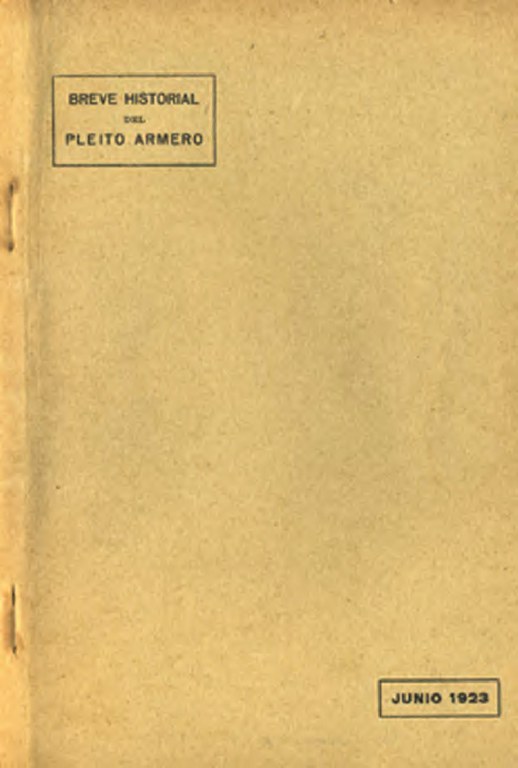Breve historial del pleito armero. Junio 1923
On the 15th of September of 1920 the Government passed a Royal Decree which regulated the sale and free possession of arms, establishing that they may only be sold to those in possession of an arms licence issued by the Guardia Civil. This body would also be responsible for controlling the purchase, sale, import and export of arms, as well as the movement of arms within the Spanish borders. This worsened the crisis already affecting Eibar companies since the outbreak of the First World War. Representatives of arms manufacturers and of local authorities therefore began a series of protests to the cabinet, which would last for more than three years, giving rise to what would become popularly known as the “Gun-makers’ dispute”. Their intention was not to have the decree repealed, but rather to minimise its effects, by ensuring that at least hunting weapons would not be subject to these restrictions, and that these arms should be regarded as sporting equipment. At the same time they requested the creation of the Basque Arms Industry Consortium, to be based in Eibar, resulting from the association of manufacturers of small and large arms, which would hold the monopoly of arms production and would be commissioned by the state to equip the army. These requests were ignored. The industrialists therefore asked for financial help from the government to allow them to make new products, such as bicycles and sewing machines. The government again refused, at which point the businessmen began to produce new products on their own initiative, without help from the state. It was in this way that industry in Eibar was finally consolidated, diversifying from the traditional arms industry to production of a wide range of consumer goods.
https://armia-eibar.eus/en/research/digital-library/pleito-armero-eibar
https://armia-eibar.eus/logo.png
Breve historial del pleito armero. Junio 1923
On the 15th of September of 1920 the Government passed a Royal Decree which regulated the sale and free possession of arms, establishing that they may only be sold to those in possession of an arms licence issued by the Guardia Civil. This body would also be responsible for controlling the purchase, sale, import and export of arms, as well as the movement of arms within the Spanish borders. This worsened the crisis already affecting Eibar companies since the outbreak of the First World War. Representatives of arms manufacturers and of local authorities therefore began a series of protests to the cabinet, which would last for more than three years, giving rise to what would become popularly known as the “Gun-makers’ dispute”. Their intention was not to have the decree repealed, but rather to minimise its effects, by ensuring that at least hunting weapons would not be subject to these restrictions, and that these arms should be regarded as sporting equipment. At the same time they requested the creation of the Basque Arms Industry Consortium, to be based in Eibar, resulting from the association of manufacturers of small and large arms, which would hold the monopoly of arms production and would be commissioned by the state to equip the army. These requests were ignored. The industrialists therefore asked for financial help from the government to allow them to make new products, such as bicycles and sewing machines. The government again refused, at which point the businessmen began to produce new products on their own initiative, without help from the state. It was in this way that industry in Eibar was finally consolidated, diversifying from the traditional arms industry to production of a wide range of consumer goods.


